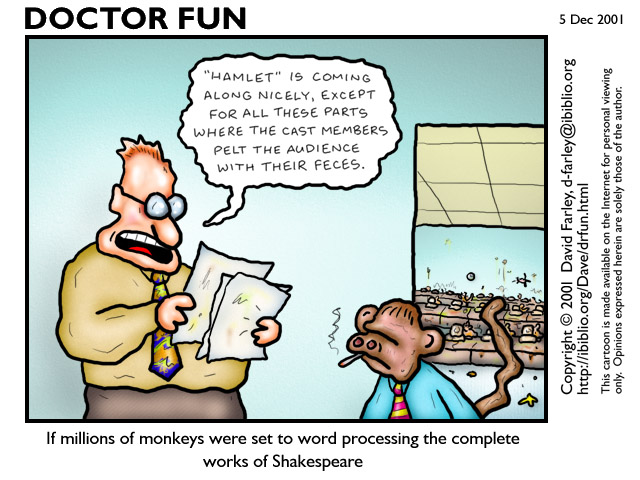
 |
Freethought & Rationalism ArchiveThe archives are read only. |
|
|
#31 |
|
Veteran Member
Join Date: Nov 2001
Location: NCSU
Posts: 5,853
|
Speaking of where did "words" come from, computation research into the evolution of languange has shown that given a set of ideas (say objects), a set of signals, a desire to link ideas with signals, and a fitness function that rewards successful communication, we find that a population of "speakers" will eventually settle down on a stable language. An interesting result is that often such stable languages have non-optimal features like:
|
|
|
|
|
#32 |
|
Contributor
Join Date: Jul 2001
Location: Deep in the heart of mother-lovin' Texas
Posts: 29,689
|
There is a chance but a vanishingly small one. 1000 monkies on 1000 typewriters in a billion years would struggle to write a single page of Shakespeare. More time and more monkeys and you increase the chances that they could produce Shakespeare's plays. But you'd only be certain they would if you had an infinite number of monkeys or an infinite amount of time.
Agreed, but what you said is not substantially different from what I said. |
|
|
|
|
#33 |
|
Veteran Member
Join Date: Jul 2002
Location: Edinburgh. Scotland
Posts: 2,532
|
Hey, I'm a pedant.

|
|
|
|
|
#34 | |
|
Veteran Member
Join Date: May 2002
Location: Just another hick from the sticks.
Posts: 1,108
|
I've tried to leave this alone. Really, I have! But I just can't stand it any longer.
. Quote:
   Sorry 'bout that. doov |
|
|
|
|
|
#35 | |
|
Contributor
Join Date: Jun 2001
Location: Baltimore, MD USA
Posts: 17,432
|
Quote:
|
|
|
|
|
|
#36 |
|
Veteran Member
Join Date: Jun 2002
Location: A Shadowy Planet
Posts: 7,585
|

|
|
|
|
|
#37 |
|
Veteran Member
Join Date: Aug 2001
Location: St Louis MO USA
Posts: 1,188
|

|
|
|
|
|
#38 | |
|
Veteran Member
Join Date: May 2002
Location: Just another hick from the sticks.
Posts: 1,108
|
Quote:
 1000 wrecked typwriters are the complete works of Dr. Dino. (hehe) doov |
|
|
|
|
|
#39 |
|
Junior Member
Join Date: Feb 2003
Location: UK
Posts: 74
|
Nobody believes that a human being came into existence through chance - evolution is essentially a non-random process. Also, nobody believes that a monkey one day gave birth to a prefectly-formed human. Humans came about through small successive approximations.
On the monkey/typewriter situation: the probability of one monkey typing up Shakespeare is vanishingly small. So too would be the probability of at least one of the thousand (the union of the probabilities for the 1000 monkeys). However If you were to look at the writings of each monkey, fish out any "real words" and combine them all in some way, then you could surely create something resembling coherent prose - that is a more appropriate analogy for evolution. |
|
|
|
|
#40 |
|
Veteran Member
Join Date: Jul 2002
Location: Edinburgh. Scotland
Posts: 2,532
|
The Shakespeare analogy is useful in demonstrating the power of a cumulative selection process acting on random events as opposed to random events alone.
Look at a simple sentence; "TO BE OR NOT TO BE, THAT IS THE QUESTION" 40 characters including spaces. Allowing for 26 letters, comma and space, how many possible combinations are there for a 40 character string. 28 to the power 40. That's a staggeringly high number. Set your computer running trying to generate that at random and it'll be running quite a while. From now till the heat death of the universe.* But with a cumulative selection process that preserves any letter that appears in the correct location, you'll do it in no time at all. That's a good analogy for demonstrating the power of natural selection. A process of preserving and building upon random success. *Complete guess. My maths ain't great. Nor is my cosmology. |
|
|
| Thread Tools | Search this Thread |
|